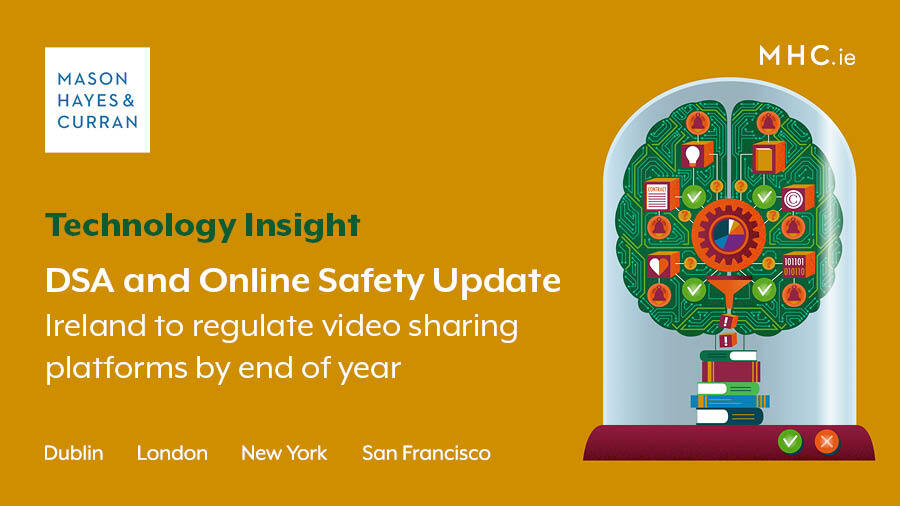DSA and Online Safety Update
Ireland to regulate video sharing platforms by end of year

Ireland’s new Media Commission has published its first annual work programme. It has committed to imposing a binding online safety code on video-sharing platforms services headquartered here, like YouTube, by the end of the year. This code will have pan-EU effect under the AVMS Directive. Technology partner, Michael Madden explores how the Media Commission will consult on and finalise procedures and policies relating to its role as Ireland's Digital Services Coordinator under the EU's Digital Services Act.
Coimisiún na Meán, Ireland’s new Media Commission, has just published its first annual Work Programme for the period up to February 2024, when the EU’s Digital Services Act (DSA) enters into full force across Europe. It is now clear that video sharing platforms established in Ireland will be subject to a binding online safety code by the end of 2023 and, under the EU’s revised AVMS Directive, this code will have pan-EU effect. The Media Commission will also finalise procedures and policies relating to its role as Ireland's Digital Services Coordinator under the DSA.
The Work Programme can be found here and highlights relating to online safety include:
By end of June 2023
The Media Commission will:
- Issue a call for inputs on its first online safety code (OSC) to be made under the Online Safety and Media Regulation Act 2022 (2022 Act). This OSC will apply to video sharing platform services (VSPS) and will have pan-EU effect under the EU’s revised AVMS Directive
- Commence a consultation on the designation of VSPS as a category of service to which OSCs can be applied. This consultation seems largely a formality as the Media Commission is required under the 2022 Act to designate VSPS as a category of services
From July 2023 to September 2023
The Media Commission will:
- Commence a consultation on a draft e-Commerce Compliance Strategy. Under the 2022 Act, the Media Commission must publish an e-Commerce Compliance Strategy setting out its approach to ensuring that no requirements under an OSC are inconsistent with the liability safe harbours and general monitoring prohibition under the DSA. When preparing an OSC, the Media Commission must have regard to this strategy
- Commence a consultation on a draft OSC(s) prepared in the light of responses received to its call for inputs
- Designate VSPS as a category of service to which OSCs can be applied
- Send information requests to individual service providers with a view to establishing whether the service should be designated as a VSPS, ie whether the service satisfies the definition of VSPS and is subject to Irish jurisdiction
- Begin consulting with stakeholders on its procedures and policies relating to its role as Ireland's Digital Services Coordinator (DSC) under the DSA. However, we assume such engagement will not commence until the Media Commission’s new Digital Services Commissioner, who will have primary responsibility for DSA matters, is appointed
- Establish a statutory ‘Youth Advisory Committee’ which is to assist and advise it on online safety matters. At least half of the Committee members must be no more than 25 years of age
- Begin consulting on the design of an industry levy to fund its new responsibilities
From October 2023 to December 2023
The Media Commission will:
- Adopt its e-Commerce Compliance Strategy
- Adopt its first OSC(s)
- Consult with and designate service providers as VSPS. It will then publish a register naming the VSPS which have been designated and what OSC(s) they must comply with
- Finalise its procedures and policies relating to its role as Ireland's DSC under the DSA
- Consult on procedures and guidelines relating to its role as a competent authority under the EU’s Terrorist Content Online Regulation (TCOR)
- Consult with ‘major platforms’, presumably those established in Ireland which have been identified as ‘very large online platforms’ or ‘very large online search engines’ under the DSA, to establish monitoring and supervision arrangements. This is ultimately with a view to assisting the European Commission in implementation of the significant additional DSA obligations applying to these services
- Finalise an industry levy to fund its new responsibilities, by means of a levy order
From January 2024 to February 2024
- 17 February 2024 will see full implementation of the Media Commission’s procedures and capabilities relevant to its role as Digital Services Coordinator for Ireland under the DSA, including compliance monitoring, notices under Articles 9 and 10, vetted researchers, trusted flaggers, complaint handling and out-of-court dispute resolution bodies
- The Media Commission will implement its procedures and guidelines relating to its role as a competent authority under TCOR
- The Media Commission will publish a new annual Work Programme
- New levy payments will apply
Conclusion
Publication of the Work Programme provides welcome clarity for digital service providers but highlights the pressing need to understand whether and how these laws impact their services. We discussed many of these topics at our recent Digital Content Regulation Seminar, available to view in full here, and will be closely following these and related developments in the coming weeks.
For more information, please contact a member of our Technology team.
The content of this article is provided for information purposes only and does not constitute legal or other advice.
Share this:




